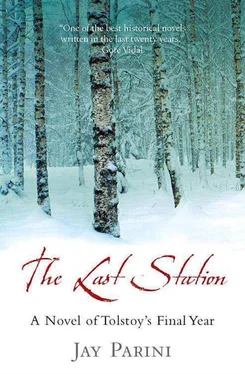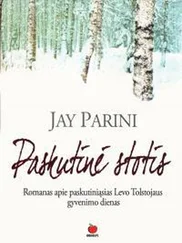Once, as I passed the stationmaster’s cottage, I found no guard at the door. Boldly, I walked in, whereupon I saw him – my dying husband – writhing in the narrow bed. I saw his white beard and hair, his bleached eyebrows, white against the white sheets. A blur of whiteness, the image of death. Death and blight!
‘Lyovochka!’ I called, but somebody was pulling me backward as I spoke, like Eurydice, back into the hell of my loneliness.
A telegram arrived from the patriarch of St Petersburg, asking my husband to repent, but Chertkov refused even to show it to him. They kept from him, too, the Abbot Varsonofy, who had come from the monastery in Optina.
On the Lord’s Day, Sunday, Sergey woke me just after midnight. I had been dreaming of a day in June, decades ago, when Lyovochka and I went running in the woods. We sat in a bright clearing, surrounded by wildflowers, and ate venison and bread and drank wine. He told me that he would never leave me, that I was his life, that he could not live without me. He pushed me back in the buttercups and daisies; he lifted my skirt, tore at me with his big hands. And he pushed through me with his indomitable spirit. He raised the fiery sword of love, and he seized me. I gave myself wholly over to his rude and flashing soul.
And now this.
‘Mama, wake up!’ Sergey said. I could smell tobacco on his breath. ‘He will not last the night. You may see him now.’
Still in my nightdress, shaking, I followed my son through the double row of journalists.
‘Is he dying, Countess?’ a man shouted in French.
I brushed them all aside.
‘Let me see him!’ I screamed at Chertkov, who stood, a stony barrier, in my path. ‘You pig! Let me through!’
‘You must be patient, Sofya Andreyevna.’
What had I been doing? Had I not been waiting for days in a stuffy railway car while they conducted a party around the bed of my dying husband?
I stooped beneath Chertkov’s outstretched arm, and he did not try to stop me.
Lyovochka lay on the bed, empty of himself. His face was blue in the dim light, his nose sharply chiseled. I felt his forehead: it was damp and burning. He was moving his lips, but there was no sound. Not even a whisper.
‘Forgive me, my darling!’ I said, as I knelt beside him. I held his hand, so lifeless and strange.
He startled, slightly, and began to gasp. He could not breathe.
‘Please, my darling, forgive me! I have been foolish. I am not a wise woman – you know that…. I am a selfish woman, yes. I have never been able to show you the love I feel. You must believe me, Lyovochka! You must understand! Please! Please!’ I was speaking too loudly, but I was not shouting.
Sergeyenko dragged me backward from the room.
‘Control yourself, Countess.’ He looked at me coldly, having pushed me onto a chair in the adjoining room. A crowd circled above me, like vultures, waiting to tear at my flesh, to feast on my remains.
‘I want to speak to my husband,’ I said, sobs sputtering between each word.
They had given him morphine against his will, I soon discovered. And further injections of camphor oil, for his heart. It was all barbarous and cruel.
Later – hours later – Dr Usov persuaded them to let me sit by his bed, provided I did not speak loudly.
Near dawn, Dushan Makovitsky held a candle to my husband’s face. Lyovochka grimaced and turned. He began to twitch and groan.
‘Have a drink, Leo Nikolayevich. Wet your lips,’ said Dushan, holding a cup to his mouth. He drank a little, and fell back, sighing.
I cried, ‘Lyovochka!’ But he could not hear me.
His breathing grew slow, then fitful.
His consciousness widened, like circles on water, each ripple farther from the old center.
Abruptly, Dr Usov cried, ‘First cessation!’
I knew what was coming now, the moment that I had imagined and replayed for years. I pressed Lyovochka’s right hand tightly to my cheek. It was hot, coursing with blood. He was still alive, my Lyovochka. ‘I know you don’t believe it, Lyovochka, but I’m sorry. I have been callous and didn’t listen to you. Can you possibly, possibly…’ I could not control my sobbing now, and Sergey reached for me, tried to comfort me, but I swept with a hand at the boy’s face, and Sergeyenko grabbed me with his big hands and pulled me back.
I damned him, and I damned Chertkov, too. They had kept my husband from me, as they’d kept him from God’s vicar, the abbot, who’d pleaded with me, for the sake of my husband’s eternal soul, to let him talk to him, if only for a minute or two.
Dushan Makovitsky stepped forward now. ‘A quarter to six,’ he said.
What did he mean? I could not understand, even as he closed the eyelids of Leo Tolstoy, shuttered the eyes that would never again look to the light, crave the light, invent the light.
They had kept me from saying good-bye to my Lyovochka. They had done this to both of us. And now, it was over.
‘I am sorry, Sofya Andreyevna.’
The voice came, strange and soft. It was Chertkov, who stood over me, a hand on my shoulder.
As dawn fluttered at the curtains, teasing and mocking, I saw it was finished – the end of the world as I had known it. What happened from now on could never really matter. Never.
– FROM THE DEATH OF IVAN ILYCH
Time did not exist for three days, while he fought hard to resist the black bag into which a hidden, invisible source was stuffing him. He fought like a condemned man fights his executioner, even though he knows that no escape is possible. He knew that each moment, in spite of his resistance, he drew closer and closer to what most horrified him. He was in agony because of that black bag, that black hole, but it was worse because he could not simply slip in. What held him up was the feeling that his life had been a good one. This self-justification buoyed him up, kept him from progressing, provoked his anguish more than anything else.
Suddenly a pressure struck him in the chest, on the side, then constricted his breathing. He slipped into the black hole, hit bottom, and found it shining. What had occurred was like the experience of being in a railway carriage when one thinks it’s moving forward but it’s really going backward, then one suddenly realizes the truth.
‘So, what I’ve experienced thus far was not the “real thing.” No matter. But perhaps I can make it the “real thing,” perhaps. But what is this thing I want?’ Ivan Ilych asked himself, then grew still.
This happened near the end of the third day, an hour before he died. At that moment, his son crept softly into the room and approached his bed. The dying man continued to cry and flail his arms. One hand touched the boy’s head. The boy grabbed it, kissed it, and began to weep. At this moment, Ivan Ilych slipped through and saw a light, and it came to him that his life had not been what it might have but that the situation was not beyond repair. ‘Yet what is the real thing?’ he asked himself and grew still, listening. Then he felt someone kissing his hand. Opening his eyes, he saw his son. He felt sorry for him. Then his wife entered the room and approached him. She looked at him softly with an open mouth, with tears on her nose and cheeks, with despair on her face. He felt terribly sorry for her.
‘Indeed, I’m making their lives miserable,’ he said to himself. ‘They pity me, but it will be better for them all when I die.’ He wished to say this but had not strength to speak. ‘But why speak? I have to do something,’ he thought. He glanced at his wife and motioned to her to remove their son.
‘Take him away… I’m sorry… for him and you.’ He would have liked to have added, ‘Forgive me,’ but instead ‘Forget’ came out. He was too feeble to correct himself, however, and didn’t worry, since He would understand who had to know what he meant.
Читать дальше












